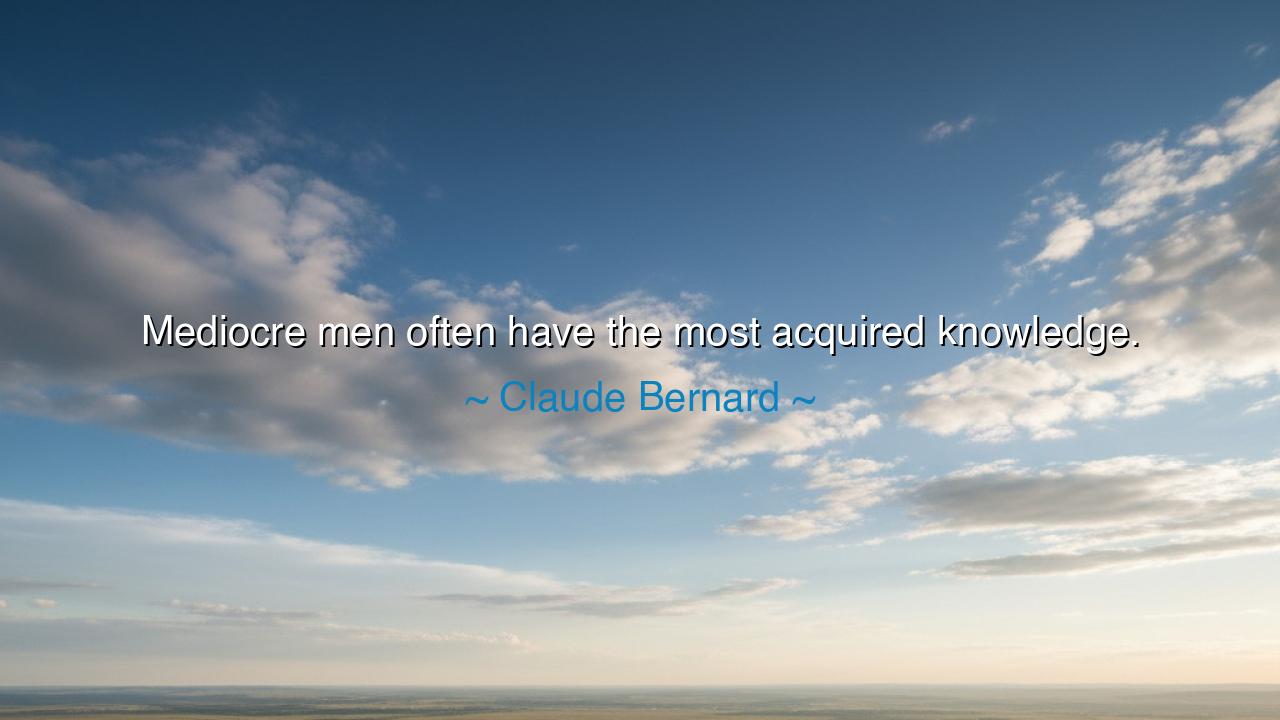
Mediocre men often have the most acquired knowledge.






Claude Bernard, the French physiologist and father of experimental medicine, once warned the world with words that still strike the mind with force: “Mediocre men often have the most acquired knowledge.” At first, this saying may seem strange—does not knowledge lead to greatness? Yet Bernard reveals a deeper truth: that knowledge by itself, if it is hoarded without imagination, courage, or wisdom, may serve only to adorn the mind of the mediocre, while true greatness requires more than the storing of facts. Knowledge is the raw stone; genius is the sculptor who shapes it into beauty.
The origin of this saying comes from Bernard’s lifelong struggle between the weight of academic tradition and the daring of discovery. He saw scholars who filled their minds with books, lectures, and the words of others, yet never dared to ask a new question or challenge a false idea. They were rich in acquired knowledge, but poor in originality. Bernard himself, however, forged new paths by experimenting boldly, proving truths through observation rather than memorization. He understood that mediocrity hides behind accumulation, while greatness emerges from creation.
History confirms this eternal law. Consider the long reign of the Byzantine scholars after the fall of Rome. For centuries they preserved the writings of the ancients—Aristotle, Galen, Ptolemy—but many did little more than copy, annotate, and debate minutiae. They were guardians of knowledge, but not innovators of wisdom. In contrast, when the Renaissance dawned, men like Leonardo da Vinci, though less burdened by libraries, dared to observe nature with their own eyes and to imagine inventions no book had yet described. The mediocres stored; the great transformed.
Think also of Socrates, who stood before the proud scholars of Athens. They boasted of their knowledge, reciting laws, histories, and verses. Yet Socrates, who claimed to know nothing, questioned them until their ignorance was revealed. His greatness was not in the quantity of facts he possessed, but in his relentless pursuit of truth and understanding. In him we see Bernard’s wisdom: acquired knowledge without humility and inquiry is vanity; inquiry without arrogance becomes wisdom.
The meaning of Bernard’s words is thus both warning and challenge. Knowledge is good, but it is not enough. The mediocre man believes that to fill his head is to strengthen his soul, yet he lacks vision, daring, and the creative spark. The great man uses knowledge as fuel, but his greatness lies in imagination, in the courage to experiment, in the willingness to fail and rise again. Knowledge is a tool, not a crown. It must serve creation, discovery, and the pursuit of truth—or it is wasted.
The lesson for us is clear: do not be content with accumulation. Do not mistake the library of the mind for the wisdom of the soul. Ask yourself not only “What do I know?” but also “What do I create with what I know?” Seek not to be a warehouse of facts, but a workshop of ideas. For the world does not remember those who memorized; it remembers those who transformed.
Practical actions follow. When you study, test what you learn in action. When you acquire knowledge, ask how it may be used for good. Cultivate curiosity, not pride. Seek creativity, not applause. Let your mind be both student and inventor, both learner and doer. In this way, you will not fall into the mediocrity of mere accumulation, but rise into the greatness of transformation.
So let Bernard’s words be etched into your heart: “Mediocre men often have the most acquired knowledge.” Guard against this fate. Do not hoard truth as treasure buried in the ground. Spend it, test it, shape it, and from it bring forth something new. For it is not the weight of knowledge that makes a soul great, but the fire that turns knowledge into wisdom.






AAdministratorAdministrator
Welcome, honored guests. Please leave a comment, we will respond soon